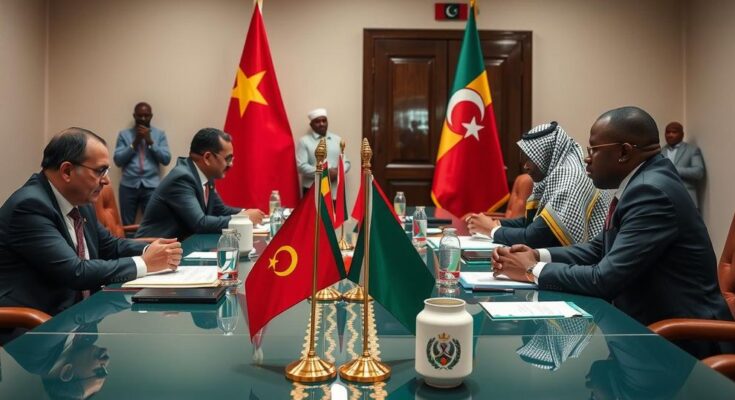The relationship between Morocco and Mauritania has significantly improved amid the complexities of the Western Sahara conflict. Both countries are leveraging their geographical proximity to enhance security cooperation and economic ties through initiatives like the Atlantic Gas Pipeline and infrastructural developments in Morocco’s southern provinces, promoting stability and regional integration.
The relationship between Morocco and Mauritania is increasingly significant, especially since the onset of the Moroccan Western Sahara conflict, which positions Mauritania as a crucial actor in the Maghreb region. Strategically located between Algeria and Morocco, Mauritania’s political and economic interests intertwine with various stakeholders, making its involvement in regional peace efforts complex. Recent scholarly observations indicate improved diplomatic relations between Rabat and Nouakchott, particularly highlighted by a meeting between King Mohammed VI of Morocco and Mauritania’s President, Mohamed Ould Ghazouani.
Historically, Moroccan-Mauritanian ties have been molded by strategic cooperation emphasizing security, stability, and development within the broader Maghreb and West African context. As both nations navigate challenges posed by terrorism, organized crime, and illegal migration, their geographic proximity compounds the urgency for collaborative security initiatives. Mauritania’s geopolitical positioning, bordered by Algeria to the east and Morocco’s contested Sahara to the north, amplifies these dynamics. Despite external pressures from Algeria, Mauritania has maintained a neutral stance concerning the Moroccan Sahara issue while seeking initiatives to foster regional economic growth.
Projects such as the gas pipeline connecting Nigeria, West Africa, and Europe, as well as the Atlantic Moroccan Initiative, exemplify efforts aimed at transforming regional economic landscapes. The development of southern Moroccan provinces is seen as critical for establishing a regional economic corridor, potentially enhancing trade routes and attracting global investment. Key infrastructural projects like the Atlantic maritime port of Dakhla are essential to solidifying maritime connections that bolster economic ties between Morocco and Mauritania. This collaboration is not only pivotal for economic development but also for establishing a robust security framework addressing shared regional threats.
In light of ongoing security issues, cooperation between Morocco and Mauritania can further extend to sectors like green energy, agriculture, and fisheries, using collaborative efforts to promote sustainable development and job creation in both countries. Enhancing cybersecurity and surveillance capabilities will contribute significantly to their defense readiness against contemporary challenges. Additionally, joint military initiatives could establish regional alliances, reinforcing collaborative resilience against threats such as arms smuggling and climate change-induced crises.
The Moroccan-Mauritanian relationship reflects a proactive regional cooperation model that merges strategic interests with practical initiatives aimed at fostering long-term stability in North Africa. With a laid foundation for collaboration on critical projects like the Atlantic Gas Pipeline, both nations can seek innovative solutions to regional dilemmas, positioning themselves as key players on the African continent. The strategic partnership must adapt to fluctuating political landscapes to attain sustainable success, promoting a flexible economic approach that encompasses shared development goals across the North African and Maghreb regions.
The strategic relations between Morocco and Mauritania have evolved significantly since the Moroccan Western Sahara conflict emerged, positioning Mauritania as a vital player in the Maghreb region. Given its geographic location, Mauritania sits at a crossroads of regional politics, impacting its involvement in peace processes amid external influences, primarily from Algeria. The historical context and shared interests have led to improved relations, which are essential for regional stability and economic collaboration.
In summary, the strategic partnership between Morocco and Mauritania offers a pivotal opportunity for enhancing regional stability and economic sustainability through collaboration. Despite historical complexities and external pressures, both nations have the potential to bolster their ties further through joint initiatives and projects. A flexible political framework prioritizing sustainable economic development and cooperation across various sectors is essential. Such a partnership, rooted in shared interests, can serve as a blueprint for regional integration and prosperity in North Africa and the broader continent.
Original Source: moderndiplomacy.eu




